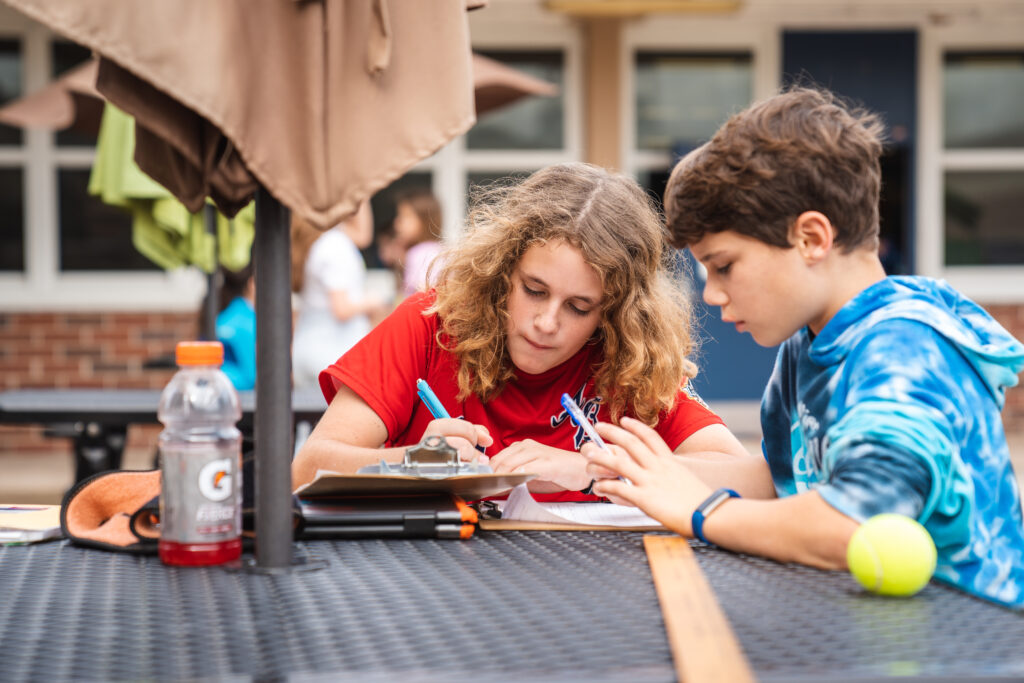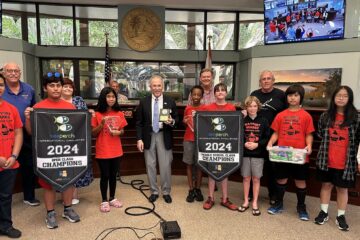June 24, 2024 – School’s out for the summer, and for most, it’s a time for rest and relaxation. Though academics are likely the last thing on students’ minds, experts say preventing summer learning loss should be a household priority.
“Helping our families keep their students engaged in reading and math activities over the summer helps students maintain the learning from the previous school year,” says Dr. Brandie Berry, Duval County Public Schools Director of K-12 Literacy.
Thankfully, sustaining your child’s academic progress doesn’t have to be difficult or boring. By implementing a few simple strategies, Dr. Berry says parents can help students remain engaged and ready for the fall.
What is summer learning loss?
Also known as “summer slide,” summer learning loss refers to the academic skills students forget over summer break. According to research:
- The average student’s test scores go down by a month’s worth of learning over summer vacation.
- Summer learning losses tend to be much higher in math, with students losing about 2.6 months of learning.
- As students get older, setbacks are more substantial and harder to overcome.
District leaders note that students entering third grade are particularly vulnerable because learning benchmarks and expectations become significantly more complex.
“When we start to get into third grade, the cognitive demand for students in ELA (English and Language Arts) and in math really ramps up,” adds Dr. Berry.
It’s for these reasons – and many more – experts say parents must take a proactive approach to their children’s education, even during the summer.
Top summer-learning strategies for students and parents
Slowing down the summer slide is as easy as incorporating simple activities into your family’s regular routine. Below, we’re breaking down our experts’ top summer learning strategies in reading and in math.

Summer reading and writing activities
Dr. Berry says the key to engaging students in reading and writing is to keep things enjoyable and organic.
“We’re not wanting to have them do a lot of worksheets and things like that. We look for opportunities where families can have fun together.”
#1 – Read for fun…and ask questions
One of the most successful reading strategies parents can adopt in preventing summer learning loss is to help their students pick out books they want to read. Dr. Berry advises parents to encourage students to read books about subjects that interest them.
As students read their books, parents can help strengthen reading comprehension by asking probing questions, such as:
- What is the book about?
- What is your favorite part?
- What is your least favorite part?
- What have you learned?
- How does this make you feel?
- What do you think will happen next?
#2 – Encourage writing and journaling
Writing regularly is equally important to maintaining students’ academic progress. Students can remain active in their writing by engaging in day-to-day activities that include:
- Composing emails
- Writing grocery lists
- Sending letters to friends or family members
Journaling is another powerful tool to sharpen writing skills. For instance, starting a vacation journal gives students a chance to express themselves and describe unique experiences. Students can also journal about non-vacation activities such as spending time with friends or going to the park.
#3 – Take advantage of summer reading lists
In need of age-appropriate book ideas? Dr. Berry suggests reaching out to your child’s school or reviewing their website for recommended titles or summer reading assignments. As an added bonus, Duval County Public Schools provides a Summer Reading Resource with suggested books categorized by grade and aligned to the state’s benchmarks.
Summer math activities
Research affirms that “math anxiety” among parents is real, leaving many to believe they lack the skills to help their children. But Cindy Berahzer, district Director of Mathematics, insists that by taking simple, organic approaches, parents can encourage growth.
“I think we need to help parents help their students to see math in real life,” shares Berahzer. “Anything from counting…to multiplication facts that can be done in a fun way.”

#1 – Incorporate math into daily activities
Berahzer says there are many ways parents can help their students “see math in real life.” Some examples include:
- Having children count the number of cars they see during road trips
- Encouraging students to look for and identify shapes at home and on errands
- Helping them understand proportions by halving or doubling recipes
#2 – Add math vocabulary to your conversations
Incorporating mathematical terms into everyday scenarios will also aid children in becoming more comfortable with important concepts. Parents can put this into practice by encouraging students to use mathematical reasoning or problem-solving skills around the home.
“Being able to say, ‘Let’s add this. How many do I have altogether here? You have five of this, we have three of these. How many do we have altogether?’ Just everyday language,” advises Berahzer.
#3 – Seek out school district expertise and resources
When in doubt, parents can look to school district math departments for additional insight, strategies, and grade-appropriate activities. By visiting the Math Department’s Summer Math Resources page, parents can find:
- Summer math parent guides for elementary and secondary students
- At-home activities for elementary students
- Summer learning opportunities via Blended Learning platforms
- Interactive, live help sessions for rising 7th, 8th, Algebra 1 and Geometry students (registration required)
District math guides include next steps, suggested usage times, and ways parents and students can track progress.
Free summer learning resources in the community
From local libraries to online platforms, parents don’t have to look far to discover free, local resources geared toward preventing summer learning loss.
#1 – Visit the Public Library
The simple act of obtaining a library card opens the door to countless reading opportunities for children, especially during the summer months. What’s more, Duval County Public Schools students can create virtual library cards with the Jacksonville Public Library by using their Student IDs.
Many public libraries will offer summer reading programs and events at no cost to families. Contact your local library for calendars, resources, and additional information.
#2 – Use Online Learning Platforms
Team Duval families looking for summer learning on the World Wide Web have another free resource –– the district’s Blended Learning platforms. The same programs students are used to using during the school year – such as Khan Academy, Waterford, Freckle, and Edmentum – remain accessible year-round. Students can use these programs at any time by logging in with their Student ID and password.

Preventing summer learning loss: The bottom line
In the end, preventing summer loss doesn’t have to be a chore.
“Kids are out for summer and we’re not trying to be a drag,” says Dr. Berry.
But it does require intentionality. By setting aside time to learn each day, students can exit the summer and enter the fall confident and ready to learn.








